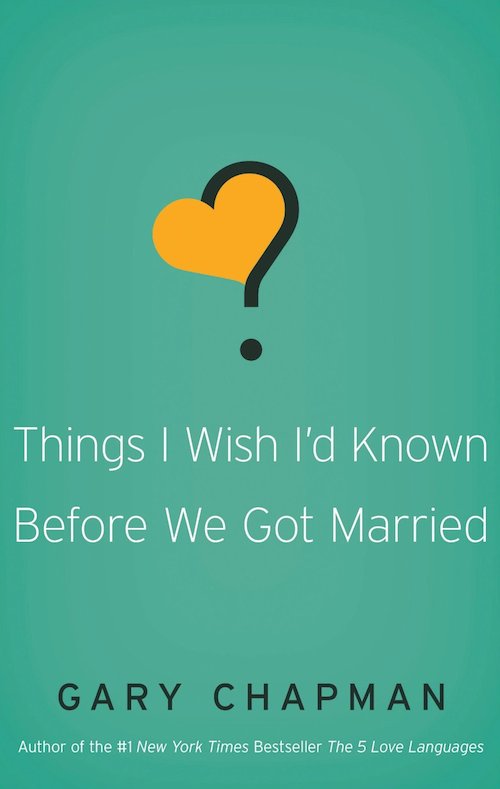 Okay, lets make one thing perfectly clear: I judged this book by its cover so hard. Look at that clean, modern, thin type-face and the simplistic little heart and question mark graphic. Had I done some reading on the author (which now seems like a name I should have recognized), Gary Chapman, I’d probably have judged differently. And frankly, probably wouldn’t have read the book.
Okay, lets make one thing perfectly clear: I judged this book by its cover so hard. Look at that clean, modern, thin type-face and the simplistic little heart and question mark graphic. Had I done some reading on the author (which now seems like a name I should have recognized), Gary Chapman, I’d probably have judged differently. And frankly, probably wouldn’t have read the book.
But, I am wanting to get my mind into the same headspace as my clients. I’d like to become more personally familiar with the challenges they are facing. Not just the headspace related to a single, hectic day. But all of the headspace that’s motivating, inspiring, discouraging and disparaging them at the moment. And since I have not married everyone everywhere, looking through the pages of a book is still a suitable alternative.
Things I Wish I’d Known Before We Got Married, from the perspective of a single person (presumably the people who he’s hoping will read the book), it wasn’t bad in its advice. Much of it was what I have been hearing my father say since I was a kid. His marriage turned out happy, and all three of their kids are happy, and all of their kids are happy. I think there’s wisdom there that I cannot fully appreciate yet, but I know it’s there.
- The ooey-gooey feelings of love are not what sustains a marriage. Those feelings, often referred to as ‘love’, are incomplete. They aren’t what makes a loving marriage, they are the result of a loving marriage.
- Children turn out fundamentally like their parents. Different in practice and pretense, but similar in motivation. If there’s something intolerable about your partner’s (a word Chapman doesn’t seem to know) parents, there’s a good chance your partner will express it too one day.
- Apologizing takes a stronger person than not.
- Forgiveness isn’t something that we necessarily have to feel. It’s a decision we make, and the feelings come in response.
There’s more.
Much of the book seems focused on avoiding conflict, rather than promoting growth. Although I suppose that Chapman would say that it’s implicit. But I disagree. Muscles grow when they are “damaged”. Friction creates heat. The metal of a blade must ground off in order to sharpen it. A lot of the advice seems to assume that the reader’s development as a person is complete–something we know doesn’t actually happen. People keep changing. Chapman’s most useful advice, I think, would have to be that which focuses on the concepts of growing together, and adapting to each other’s iterations. Iterating each other, even. Namely, the stuff of Chapter Two: “That Romantic Love Has Two Stages”.
The book assumes that divorce is the worst-case scenario, though it never explicitly states it. Again, I disagree. I wouldn’t want anyone I care about to get divorced. But I also wouldn’t want one or both of them to live miserably forever either. That seems like a far worse case scenario to me. And probably a likely one in situations where one member of the couple simply won’t try. That’s a real thing that happens. I wish Chapman had discussed the concept of divorce from a more reasonable light. Yes, it’s an option. But, not one to be taken lightly. There’s a lot that can, and should, be done first.
It should be obvious that an Easter-Christmas Christian is very different from a daily “quiet time” Christian
As the book comes around to the end, it gets, uh, really Christian-y, starting in chapter eleven: “That Spirituality is Not to Be Equated with Going to Church”. The book takes on a kind of forked tongue.
During a sizable section of the book, he asks to speak with his “Christian readers”, where he encourages them to figure out “What kind of Christian” they are dating. These are veiled words, assumed to be read by both “kinds” of Christian. If I’m reading between the lines correctly–and I totally feel like I am, shocker–The real Christians (as collectively defined as people who are more involved with a church community and daily “quiet times” than just on holidays), will read that they shouldn’t marry this person. The other “Christian” (Chapman’s quotation marks, not mine), will be so overwhelmed they will become a real Christian.
There’s an actually story like that in there.
Though it’s not entirely obvious from the first three quarters of the book, it gives very little consideration to the concerns of other cultures, religions and lifestyles.
In Conclusion
Chapman is a marriage counselor. He’s educated. After reading this book, it’s clear that Christian couples are his business niche. On some level, he’s saying what those people want to hear, not necessarily what they need to hear. Someone who cannot accept divorce will spend a lot more money on educational materials that promise to improve their situation. And for a lot of people, it will. But it’s a business decision, not necessarily a moral one. The book has a very narrow world-view, and although there’s good stuff in there, I just think a more balanced author could do a lot more justice to those of us who hope to be wed one day.

Recent Discussion